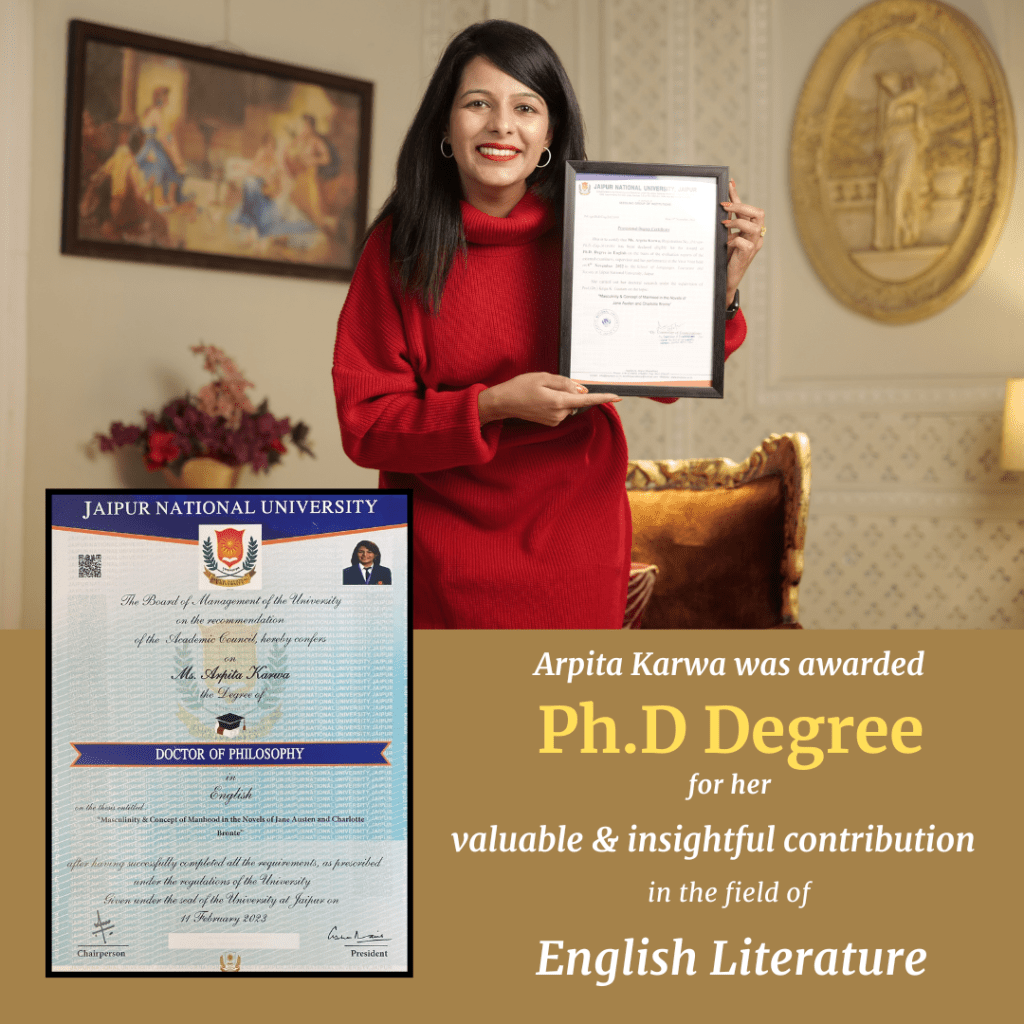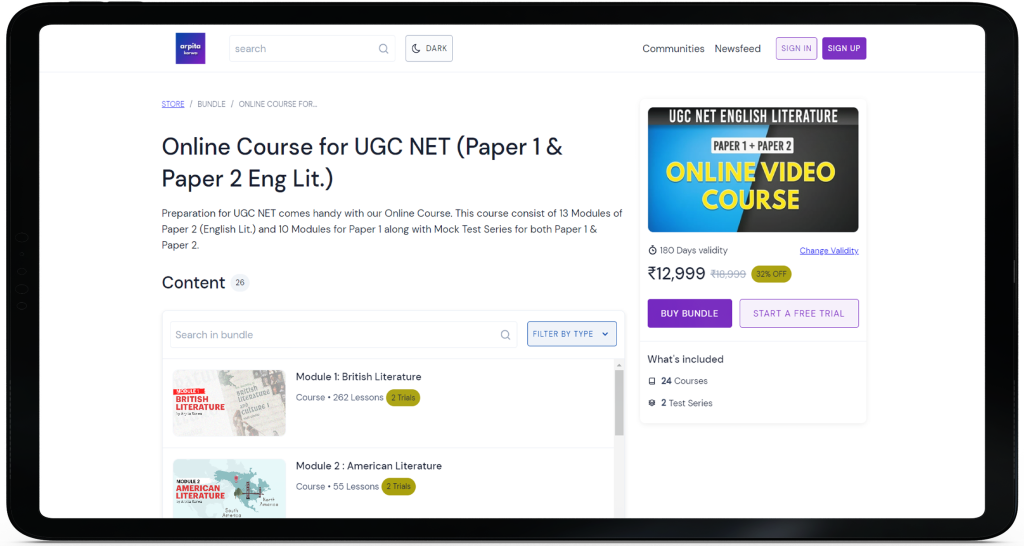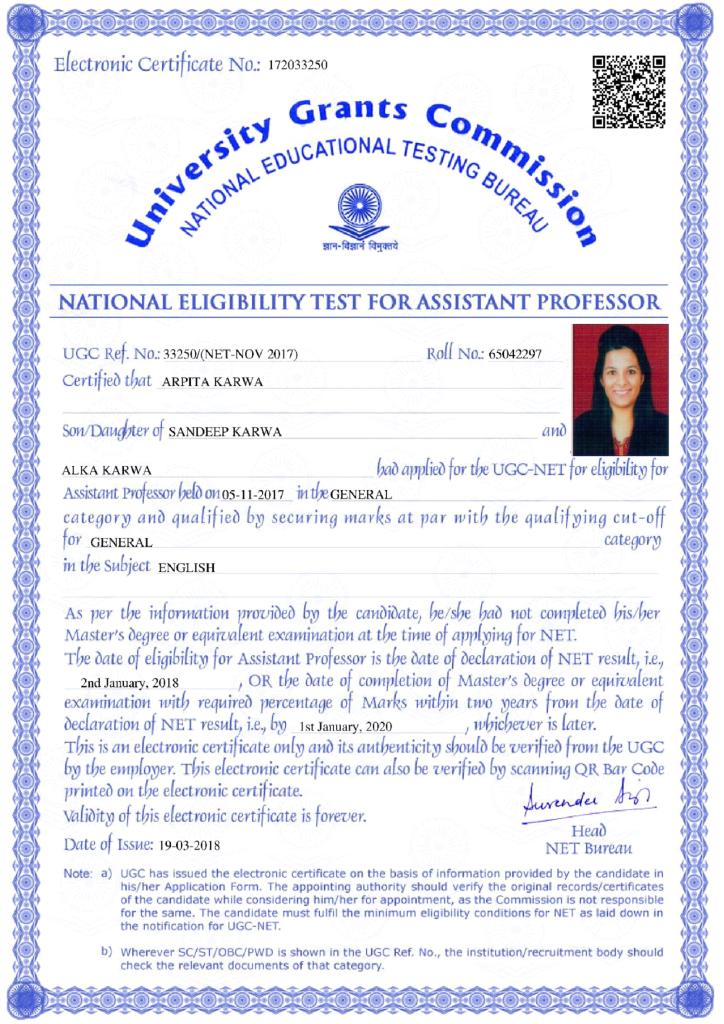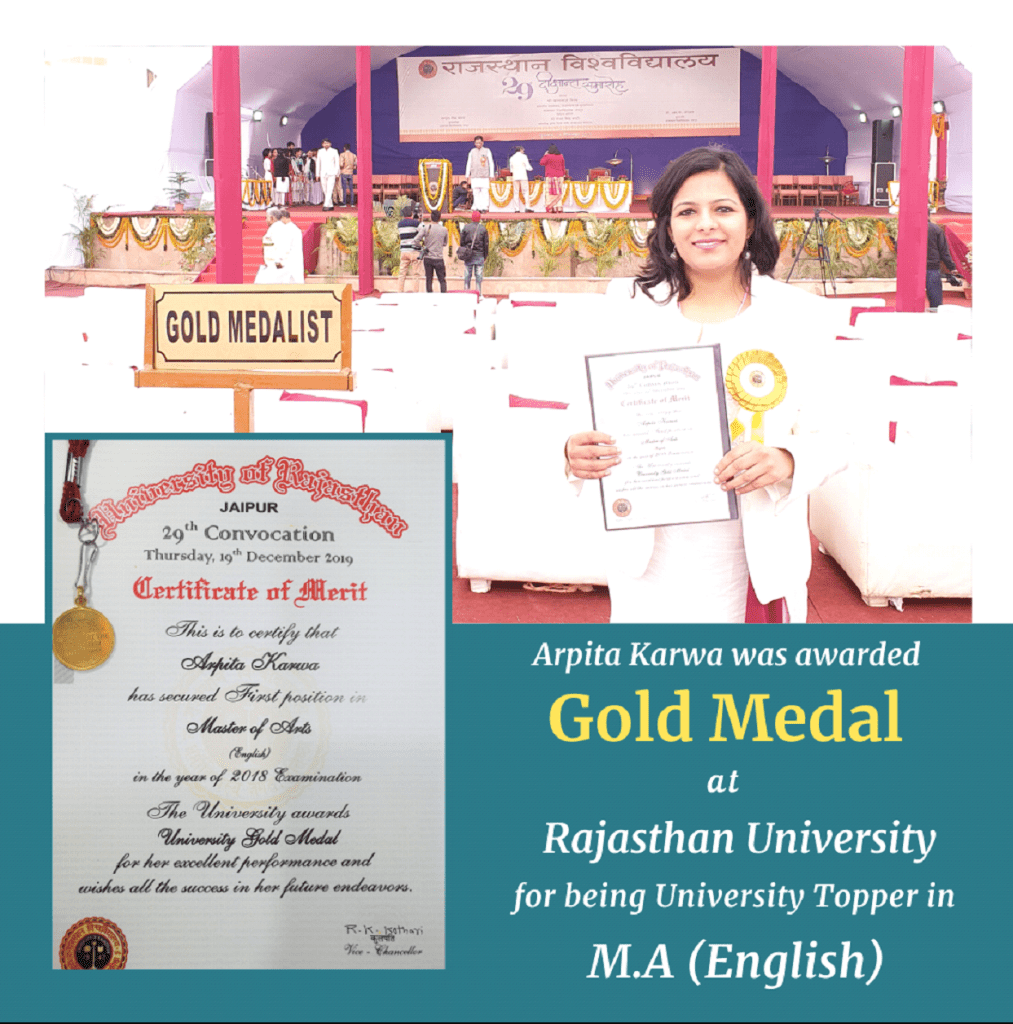JAMIA MILLIA ISLAMIA M.A. ENGLISH, ENTRANCE EXAM 2019
June 19, 2023 2023-12-09 18:33JAMIA MILLIA ISLAMIA M.A. ENGLISH, ENTRANCE EXAM 2019
JAMIA MILLIA ISLAMIA M.A. English, Entrance Exam 2019
JAMIA MILLIA ISLAMIA
M.A. ENGLISH ENTRANCE EXAM, 2019
PART-A OBJECTIVE TYPE QUESTIONS
Q.1) Who, among the following, is not an Australian writer?
[1] Patrick White
[2] Les Murray
[3] Alice Munro
[4] Peter Carey
Answer: Alice Munro
Q.2) Which English poet was Sylvia Plath married to?
[1] Hughes
[2] Masefield
[3] Rilke
[4] Larkin
Answer: Hughes
Q.3) The name of the central character in Things Fall Apart is:
[1] Okonkwo
[2] Kurtz
[3] Adisa
[4] Barack
Answer: Okonkwo
Q.4) Sidney’s Defence of Poesie was written in response to:
[1] Poetics
[2] The Courtier
[3] The School of Abuse
[4] On the Sublime
Answer: The School of Abuse
Q.5) What is the name of the storyteller of One Thousand and One Nights?
[1] Alf Layla
[2] Noorjehan
[3] Sultana
[4] Scheherazade
Answer: Scheherazade
Q.6) Which is Charles Dickens’s first novel?
[1] David Copperfield
[2] The Pickwick Papers
[3] Oliver Twist
[4] Little Dorrit
Answer: The Pickwick Papers
Q.7) Pablo Neruda belongs to:
[1] Peru
[2] Cuba
[3] Chile
[4] Argentina
Answer: Chile
Q.8) The Diary of Anne Frank was originally published in:
[1] Dutch
[2] German
[3] French
[4] English
Answer: German
Q.9) Which book won the first Man Booker prize?
[1] Heat and Dust
[2] Midnight’s Children
[3] The Luminaries
[4] Something to Answer For
Answer: Something to Answer For
Q.10) Who is the author of Around the World in Eighty Days?
[1] H.G. Wells
[2] Jules Verne
[3] Thomas Hardy
[4] Mark Twain
Answer: Jules Verne
Q.11) In which play does “Forest of Arden” figure?
[1] Much Ado about Nothing
[2] Richard II
[3] As You Like It
[4] Hamlet
Answer: As You Like It
Q.12) Who wrote the book The Republic?
[1] Aristotle
[2] Socrates
[3] Horace
[4] Plato
Answer: Plato
Q.13) In Marlowe’s play, what was the name of the Jew of Malta?
[1] Shylock
[2] Barabas
[3] Solomon
[4] Lazarus
Answer: Barabas
Q.14) The setting of the poem “The Solitary Reaper” was inspired by the poet’s stay in:
[1] Scotland
[2] France
[3] England
[4] Wales
Answer: Scotland
Q.15) An edition of Mulk Raj Anand’s The Untouchable carries a foreword by:
[1] Mahatma Gandhi
[2] D.H. Lawrence
[3] Henry James
[4] E.M. Forster
Answer: E.M. Forster
Q.16) In The Pride and Prejudice, the Bennet family lives in the village of:
[1] Pemberley
[2] Mansfield
[3] Longbourn
[4] Brighton
Answer: Longbourn
Q.17) Showalter begins her essay ‘Feminist Criticism in the Wilderness’ by discussing a dialogue between:
[1] Carolyn Heilbrun and Catherine Stimpson
[2] Bell Hooks and Judith Butler
[3] Virginia Woolf and Kate Millet
[4] Nancy Frazer and Angela Davis
Answer: Carolyn Heilbrun and Catherine Stimpson
Q.18) Which month is the cruelest in ‘The Waste Land”?
[1] March
[2] April
[3] December
[4] January
Answer: April
Q.19) Which, among the following, is not written by Keats?
[1] Ode to Psyche
[2] Ode on Melancholy
[3] Ode to the West Wind
[4] Ode to a Nightingale
Answer: Ode to the West Wind
Q.20) Who is Shock in The Rape of the Lock?
[1] Belinda’s Dog
[2] Belinda’s Angel
[3] Belinda’s Maid
[4] Belinda’s Beau
Answer: Belinda’s Dog
Q.21) The term ‘Theatre of the Absurd’ was coined by:
[1] Martin Esslin
[2] Samuel Beckett
[3] J.L. Styan
[4] John Osborne
Answer: Martin Esslin
Q.22) According to Aristotle, Epic presents men:
[1] As they are
[2] Worse than they are
[3] Better than they are
[4] As they ought never to be
Answer: Better than they are
Q.23) ‘Hearing a colour or ‘Seeing’ a smell is an example of:
[1] Synaesthesia
[2] Oxymoron
[3] Hyperbole
[4] Assonance
Answer: Synaesthesia
Q.24) Aspects of the Novel is written by:
[1] David Lodge
[2] E.M. Forster
[3] Henry James
[4] Walter Allen
Answer: E.M. Forster
Q.25) The Lay of the Last Minstrel’ is written by:
[1] Wordsworth
[2] Coleridge
[3] Walter Scott
[4] Shelley
Answer: Walter Scott
Q.26) Who is the author the work Simulacra and Simulations?
[1] Jean Francois Lyotard
[2] Jean Baudrillard.
[3] Julia Kristeva
[4] Roland Barthes
Answer: Jean Baudrillard
Q.27) What is the sub-title of the play Twelfth Night?
[1] Or, What you Want
[2] Or, What you Think
[3] Or, What you Like
[4] Or, What you Will
Answer: Or, What you Will
Q.28) Who’s Afraid of Virginia Wolf?” is a/an:
[1] play by Edward Albee
[2] novel by Melville
[3] essay by Sylvia Plath
[4] poem by Kamala Das
Answer: play by Edward Albee
Q.29) The Trotter Nama is written by:
[1] Ruskin Bond
[2] Vikram Seth
[3] Amit Choudhuri
[4] Allan Sealy
Answer: Allan Sealy
Q.30) ‘Saki’ is the pen name of:
[1] Somerset Maugham
[2] William Hazlitt
[3] H.H. Munro
[4] Robert Bums
Answer: H.H. Munro
Q.31) When was Paradise Lost published?
[1] 1669
[2] 1667
[3] 1657
[4] 1659
Answer: 1667
Q.32) Shelley’s ‘Adonais’ is an elegy on the death of:
[1] Donne
[2] Byron
[3] Keats
[4] Milton
Answer: Keats
Q.33) Who wrote the poem ‘The Defence of Lucknow’?
[1] Tennyson
[2] Yeats
[3] Browning
[4] Swinburn
Answer: Tennyson
Q.34) In which country is Macbeth set?
[1] Denmark
[2] Scotland
[3] Spain
[4] Germany
Answer: Scotland
Q.35) ‘Rain races, ripping and restless in its rage.’ This sentence is an example of a/an:
[1] oxymoron
[2] hyperbole
[3] personification
[4] alliteration
Answer: alliteration
Q.36) Who is the author of Piers Plowman?
[1] Sir Thomas Malory
[2] Geoffrey of Monmouth
[3] William Langland
[4] Geoffrey Chaucer
Answer: William Langland
Q.37) Who wrote: ‘Shall! compare thee to a summer’s day! Thou art more lovely and more temperate …?
[1] Shakespeare
[2] Milton
[3] Donne
[4] Marlowe
Answer: Shakespeare
Q.38) Who wrote “The Dunciad?
[1] Milton
[2] Gay
[3] Dryden
[4] Pope
Answer: Pope
Q.39) In Coleridge’s poem The Rime of the Ancient Mariner’, where were the three gallants going?
[1] A funeral
[2] A birth ceremony
[3] To the church
[4] A wedding
Answer: A wedding
Q.40) Who is credited to have written the Panchatantra?
[1] Banabhatta
[2] Vishnu Sharma
[3] Abhinavagupta
[4] Kalidasa
Answer: Vishnu Sharma
PART-B: SUBJECTIVE TYPE QUESTIONS
Q.1) Write an essay on any one of the following in not more than 750 words:
(A) “As a women I have no country. As a woman I want no country. As a woman, my country is the whole world.” – Virginia Woolf
(B) “Non-fiction can distort… But fiction never lies.”- V.S. Naipaul
(C) “An enemy is someone whose story you have not heard.” – Slavoj Zizek
Answer: (A)- As a woman, I have no country. As a woman I want no country. As a woman my country is the whole world,’ Virginia Woolf wrote in 1930s Britain. The poles of unequal/equal, male/female and national/ international that orient her ringing phrases also offer new bearings for the significance of the plebiscites held in Europe after World War I, and the movements and metaphors at work in them.
‘As a woman, I have no country’ alludes to the British laws of the day that deprived women of British nationality on their marriage to a foreigner, as well as excluding them from public life. United by their legal inequality, women in Britain and other countries actively campaigned domestically and internationally for the same right as men to choose their nationality, just as they fought for the same right to vote.
Woolf presents her pledge of indifference – ‘As a woman I want no country’ – as logical given that England was ready to make her a foreigner if she married a foreigner. But she maintains that even if the laws on nationality treated women and men equally, women would not be nationalists. ‘As a woman I want no country’ reflects Woolf’s contention too that women cannot understand what instinct compels men to take up arms for their country, ‘what glory, what interest, what manly satisfaction fighting provides for him’.
While Woolf insists on this commonality of gender, she uses it to proclaim that ‘as a woman, my country is the whole world’.
Until World War I, the nationality laws of virtually all countries made a married woman’s nationality dependent on her husband’s nationality. The first of Virginia Woolf’s (1993) three clarion phrases in her 1938 political work, Three Guineas- “As a woman, I have no country. As a woman I want no country. As a woman my country is the whole world” is a bitter allusion to British laws of the day that deprived a woman of British nationality, also called the principle of the unity of nationality of spouses, rested on the conviction that the members of a family should have the same nationality and on the patriarchal notion that the husband should determine that nationality.
On the principle of dependent nationality woman who married a foreign national lost her own nationality and acquired that of her husband simply by virtue of marriage. If her husband’s nationality changed or was lost during the marriage, her nationality altered accordingly.
Particularly galling to women was the situation where a woman after marriage continued to live in her own country but was deprived of the civil, political, economic, and social rights that depended upon nationality. For feminists of the time, this situation reproduced the second-class citizenship of all women in society.
A woman who was abandoned or widowed did not have the right to return to her own country, since that right is a function of nationality. If she were able to reenter, she would find herself without the rights attached to nationality. Dependent nationality, moreover, could render a woman stateless upon divorce. In many cases, women became stateless without even being aware of it.
After World War I, women’s organizations campaigned actively for changes to the domestic laws on nationality and for an international treaty that would guarantee women’s equality with men in matters of nationality.
Because international law requires a state to admit its nationals and to allow them to reside within its territory a common nationality guarantees that the members of a family can live together within the state of nationality (the right to enter) and can continue to do so (the right not to be expelled). Within the state, a common the material well-being of the family. Theories of citizenship have more often focused on citizenship as the possession of full political rights, but citizenship also carries important economic and social benefits.
Q.2) Write a reflective essay on any one of the following in not more than 500 words:
(a) Post-modernism
(b) Genre Fiction in Indian English
(c) Age of Reason
Answer: (A) Postmodernism-Postmodernism is the term used to refer to the non- realistand non-traditional literature and art of the post-Second World War period. Literature and art during this period took certain modernist characteristics to an extreme limit. The term is also used to refer to the general human condition in the “late capitalist” world of the post 1950s.
The term postmodernism was first used emphatically in the 1960s by critics such as Leslie Fielder and Ihab Hassan for the change of sensibility that occurred during the period. Arnold Toynbee became the first person to use the term outside the specific literary critical sense, when he announced in 1947 that we were entering the postmodern age. In the mid 1970s the term gained importance and comprised first architecture, and later dance, theatre, painting, film and music.
Jean Francois Lyotard is undoubtedly one of the most important early theoreticians of postmodernism. Lyotard, a French philosopher, was commissioned by the Council of Universities of Quebec in the late 1970s to do a survey of the state of knowledge in the Western world. In his seminal work The Post-Modern Condition: A Report on Knowledge, first published in 1979 in French and later translated into English in 1984 he decided to use the word “postmodern” to describe the condition of knowledge in the most highly developed societies. He posited a simple definition for the idea of ‘postmodern’ as “incredulity to metanarratives.” By metanarrative Lyotard means all those grand narratives or intellectual discourses which aim to offer a comprehensive frame in which to understand some aspect of modern life. The Enlightenment belief in progress, Darwinian theory of evolution, Marxism, Freudian psychology are all metanarratives.
Jean Baudrillard, the French sociologist was concerned with the transformation that occurred to signs in the passage of time. For him in the postmodern times it is the “Map that precedes the territory” instead of territory preceding the map. Now it is simulation opposed to representation. Simulation is “the radical negation of sign as value.” For him the four successive stages, the image goes through are the following:
• It is the basic reflection of reality.
• It masks and perverts a basic reality.
• It masks the absence of a basic reality.
• It bears no relation to any reality whatever; it is its own pure simulacrum.
Another important postmodern theoretician is Frederic Jameson who wrote the foreword to Lyotard’s book The Postmodern Condition.
In postmodernism “text” is supplemented or displaced by “discourse.” A keynote feature of postmodernism is the fading of boundaries between genres.
















